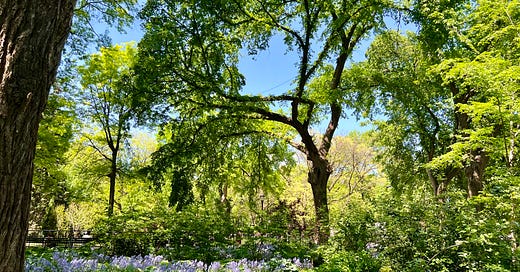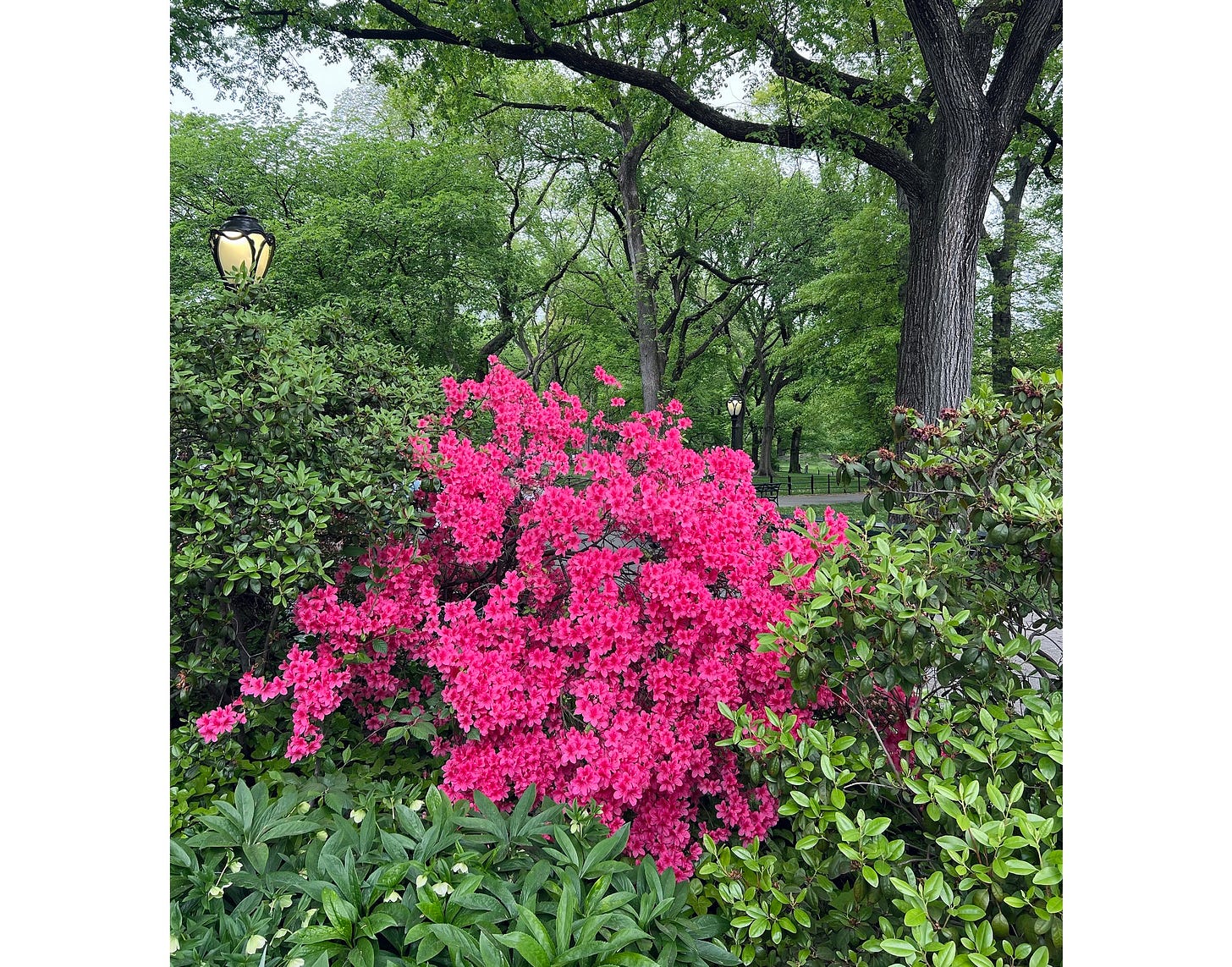🚶♂️Writing Walks and the Awe of Spring
"I 'write' in the notebook of the mind, with the foot in motion — what happens upon returning from the long daily walks that sustain me is mostly the work of transcription. — Maria Popova
One of the fun things about meeting my subscribers has been the uncertainty. I never know where the conversation will go or how it will connect with a topic I’m writing about. Recently, I met someone who has been on an insane walking streak: 2-5 miles a day since 2011! Every. Single. Day!
We talked about Jerry Seinfeld’s commitment to consistency to support the path to mastery. Every day after finishing his writing practice, Seinfeld marked the calendar with an X. Once you have a calendar sheet filled with X’s, “you don’t want to break the streak.” I’ve used this to get consistent with meditation, logging 400+ days on the Insight Timer app.
This year, I’ve been looking for other practices to bring rhythm, motion, and ritual to my days and help me gain focus, move through darkness, and find clarity. My favorite practices are dead simple, don’t get boring, and don’t build tolerance. On the contrary, they seem to work better over time: walks, meditation, working out, time in nature, naps, stimulating conversation. When in doubt, the answer always seems to be ‘more’ (well, perhaps not for naps).
Recently, I’ve started doing silent walks. A few loops at my local park followed by a stroll through the city — no music, no podcasts, and my ears protected by ‘high fidelity’ earplugs you’d wear at a concert or club (they reduce the volume but don’t muffle everything). This has been a revelation: precious inner stillness among the sirens, the jackhammering, and the hissing engines of the great machine that we call an economy.
I got the idea from one of my sound meditation teachers, the wonderful Alexandre Tannous, who has dedicated his life to work at the intersection of acoustics and consciousness (if you ever get the chance to hear him play, go!). If you live in a city, Alexandre even recommends sleeping with earplugs.
Anyway, my walks have turned into a peaceful inner oasis amidst the buzz of the human beehive. Sometimes I consciously choose to listen to an audiobook or music, but I no longer default to distractions. The walks become a walking meditation, a space for the creative night shift (I record ideas with Otter.ai).1
One thing that happens at the intersection of stillness and consistency is increased awareness. This felt like the first year in my life that I truly witnessed the arrival of spring. Every morning, I noticed a different corner turning green, a new kind of flower blossoming, another layer of branches sprouting. Each day I felt surprised by how much had happened in the short while I’d been gone.
Jonathan Haidt named “finding awe in nature” one of the core six spiritual practices and assigned his NYU undergrad class to take ‘awe walks’: slow walks, anywhere outside, without their phones. He called the students’ written reflections “among the most beautiful I’ve seen in my 30 years as a professor.
He points out the work by social psychologist Dacher Keltner who wrote that “awe shifts us from a competitive, dog-eat-dog mindset to perceive that we are part of networks of more interdependent, collaborating individuals. We sense that we are part of a chapter in the history of a family, a community, a culture.”
That’s exactly how I feel among the birds and trees, open to the small wonders of the world — and especially so in contrast with the sharp edges and noises of the urban environment.
Every morning, you step into the garden of your mind.
Some days it may feel a little barren. Trust me, I have moments when I tap my head and ask, ‘is this thing on?’ That’s the garden in winter. What kind of seeds you plant at that time matters. What kind of thoughts you pursue matters. Whether you open space for new plants and new ideas, matters.
Keep showing up. Keep tending to your garden. Add an X to the calendar every time you do.
One day, spring will arrive.
One day, you will find yourself surrounded by flourishing, blossoming, and lush colors.
One day, you will look at your garden in awe.
A few seeds for Sunday:
Gurwinder: Why Everything is Becoming a Game. A fantastic essay that touches on dopamine culture and “the creeping phenomenon of gamification” which makes us “act against [our] own interests.”
Even in a world where everything is a game, you don’t have to play by other people’s rules; you have a wide-open world to create your own.
Why You Can’t Get a Restaurant Reservation (New Yorker). This reminded me of young Warren Buffett who had the same combination of ruthless drive and knack for games. If I ran a hedge fund, I'd hire a bunch of these kids, provide them with infrastructure and a profit share, and unleash them on markets. Guess I just re-invented the pod shop.
Some people play Candy Crush on their phone. I play ‘Dinner Reservations,’ ” he said. “It’s just a way to pass the time.” Last year, he made eighty thousand dollars reselling reservations.
Jerry Seinfeld’s movie promotion tour: New Yorker and GQ interview. We already talked about Seinfeld’s emphasis on mastery — “I don’t believe in being good at a lot of things—or even more than one.”
He also made an interesting point about money and culture picked up by Ben Carlson:
SEINFELD: In the seventies, this is the tragic turn of American culture. And this was explained to me by Mario Joiner who cracked this puzzle. I could not figure out what the hell happened. That money became everything. … the eighties was the first time that young guys could make a lot of money fast. Never existed before. Rich guys were Aristotle Onassis, Andrew Carnegie, shipping, iron. You couldn’t make a lot of money fast in those days. And it has poisoned our culture to this day.
Technology and finance have indeed made it possible for people to get rich fast and while still young (and with little starting capital). Buffett was once asked why his moat persisted and his answer was that nobody wanted to get rich slowly. But mastery takes patience, something that Seinfeld understands well.
You must master waiting as a comedian. You must be able to just wait, comfortably. 'The show's gonna be delayed a half hour,' you just go 'fine'. 'The plane's gonna be delayed two hours,' fine. 'Career is gonna be delayed five years,' fine. You gotta be able to wait. — Seinfeld on an old episode of 60 Minutes
Then again, he also falls into the trap of idolizing the early days, the simple days, when it was all about the craft and not the money.
“You wake up in the morning and you paddle out. You make whatever little money you need to survive. That seems like the greatest life to me. … You want to be broke. You want it to be all you’ve got. That’s when life is great.”
That’s of course a thing you say after you’ve made the money.
Happy Sunday!
“Remain seated as little as possible,” Nietzsche advised. “Put no trust in any thought that is not born in the open, to the accompaniment of free bodily motion.”






Thank you for showing us the way to “awe”. It is so available to each of us - like daily rituals!